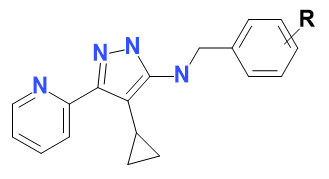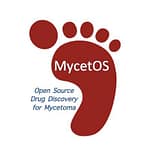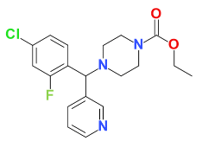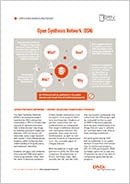
The Open Synthesis Network (OSN) is a collaborative project that aims to engage master’s and undergraduate students in research for neglected diseases. Currently, the OSN includes 25 institutions from around the world.
OSN participants have successfully delivered more than 500 new compounds for eight distinct DNDi projects in leishmaniasis, Chagas disease, mycetoma, and COVID-19. All successful compounds that come out of the OSN project will be further evaluated as part of DNDi’s discovery pipeline.
How the Open Synthesis Network works
DNDi shares data on existing compounds from the relevant research projects with university participants, along with a list of new, ‘wanted’ chemical compounds. Students then explore the existing data, learn about the design rationale for the new compounds through open discussions with DNDi experts, and carry out the synthesis for one or more of these wanted compounds as part of their lab training. Students can use the data to design their own new compounds. DNDi tests all new compounds for relevant anti-infective activity, sharing the results openly with all OSN participants.
Dr Kapil Juvale, Assistant Professor, Narsee Monjee Institute of Management Studies, IndiaThis partnership will contribute to real-life medicinal chemistry projects featuring neglected disease research. By participating in the OSN project, our students will get an opportunity to enhance their skills in medicinal chemistry research and will develop an interest to work on real drug discovery projects.
Intellectual property
All work generated by OSN will be published in the public domain in real-time and remain free of intellectual property.
How to get involved
The online nature of OSN readily allows DNDi to open this collaboration to any universities interested in participating. To get involved, please contact Luiza Cruz: lcruz@dndi.org
Follow OSN on Twitter: @OpenSynth
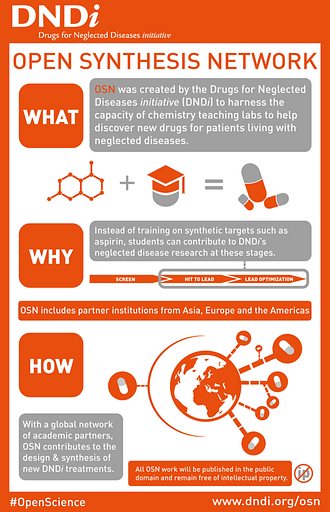
Project updates
2023
A partnership with the University of Dundee Wellcome Center for Anti-Infectives Research (WECAIR) was initiated to support trainees in running DMPK assays (lipophilicity, microsomal clearance, solubility, and permeability) using OSN and MycetOS as tool compounds. The most active and non-cytotoxic compounds from the P5, P6, and P7 series were selected for the first wave of assays. Results now available for each series will allow for a more complete analyses of structure-activity and structure-property relationships that are hoped to provide insights into the design of new compounds.
2022
Two drug discovery projects for leishmaniasis and one for Chagas disease progressed in 2022. Work on MycetOS will continue under the leadership of University College London (UCL), UK, with support from DNDi.
2021
The first two manuscripts on the work of the OSN were completed in 2021 and are expected to be published in early 2022. The network continued to make progress on four DNDi discovery projects focused on visceral leishmaniasis and Chagas disease, while also contributing to the MycetOS and COVID Moonshot open science projects.
2020
Four new projects were launched by the OSN in 2020, including OSN’s participation in the global COVID Moonshot initiative. The OSN website was revised to increase ease of data access.




